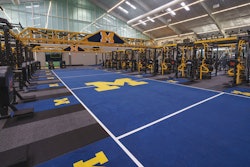Copyright 2018 The Washington Times
All Rights Reserved
The Washington Times
The same performance-enhancing activity that got Russian athletes banned from the Olympic Winter Games may have helped a transgender male athlete win the girls' Texas high school wrestling championship.
Mack Beggs, who was born a girl but identifies as male, is just the latest transgender athlete whose achievements have raised questions about how to let everyone compete without creating an uneven playing field.
The Texas agency that governs high school athletics requires athletes to compete as the sex listed on their birth certificates.
Attorney Jim Baudhuin, a father of a wrestler who unsuccessfully filed a lawsuit to prevent Mack from competing while undergoing testosterone therapy treatments last year, said it's not fair to allow some athletes to use performance-enhancing drugs.
"Mack shouldn't have been wrestling against the girls any more than the East German women shouldn't have been showing up at competitions with chest hair and deep voices," Mr. Baudhuin said. "It's doping. If you're one of the other athletes, you don't care why she's taking it. The physiological effects on the body aren't any different whether you're taking it to transition or taking it to dope."
Mack, a senior at Euless Trinity High School who formerly went by Mackenzie, defeated Chelsea Sanchez of Morton Ranch High School on Saturday to claim the 6A 110-pound title for the second year in a row.
Mack held the lead late in the match but was nearly pinned before flipping his opponent onto her back to claim the title. A cascade of boos and some cheers rained down as Mack turned to each section of the crowd and pointed to his heart.
The wrestler's mother, Angela McNew, dismissed the notion that Mack was "beating up on girls."
"The girls he wrestles with, they are tough," Ms. McNew told the Dallas Morning News. "It has more to do with skill and discipline than strength."
Kayla Fitts, a senior at Cypress Ranch High School who had 52 wins and no losses before falling to Mack in Saturday's semifinals, said the transgender wrestler's strength "definitely was the difference."
Asked whether she thought it was fair that she had to wrestle against Mack, she responded, "No."
"I understand if you want to transition your gender," Kayla told the Dallas Morning News. "I understand that totally. But there's a time and a place. You can do that after high school. Or if you want to do it, you can quit the sport. Because I don't think it's fair at all that you're taking testosterone. That's steroids. I know it's not a lot. But still."
Mack's road to last year's state championship included several forfeits by girls who feared they would be injured. Mr. Baudhuin said parents in the wrestling community became concerned last season by the transgender wrestler's increasingly masculine appearance.
"She began to show up at tournaments noticeably more masculine needing to shave and things like that," Mr. Baudhuin said. "It was obvious that the testosterone was starting to take effect. Parents were starting to get upset, because Mack at this point was so much more aggressive than other girls. You could see the difference."
The University Interscholastic League, the body that governs high school athletics in Texas, forced Mack to compete against girls because of a regulation requiring students to compete in the division of the sex listed on their birth certificates.
The agency's rules also prohibit steroid use unless prescribed by a licensed practitioner for a valid medical purpose.
Texas cut the funding for a program that tested high school athletes for anabolic steroids in 2015, but the regulations against performance-enhancing drugs are still in effect. Athletes are required to sign an agreement not to use steroids in order to compete.
Mack expressed a desire to compete against boys each of the last two years, but the University Interscholastic League previously said it had never received an official request from an athlete to change divisions.
Athletes and testosterone
When asked about the rule that forced Mack to compete with girls, a spokesperson for the league referred to the agency's FAQ page. A subsequent request for comment was not returned.
Athletic associations ranging from the Olympics to the NCAA have grappled with how to let transgender athletes compete while upholding the integrity of their sports.
Guidelines adopted by the International Olympic Committee in 2016 allowed biologically female athletes to compete against males "without restriction." Biological males who wish to compete against females are required to demonstrate that their testosterone levels are beneath a certain level one year before their first competition.
The NCAA Office of Inclusion issued similar policies in 2011 requiring biologically female athletes who use testosterone to facilitate their transitions to compete on men's teams. Athletes who identify as women are eligible to participate in women's divisions only after undergoing testosterone suppression treatment for one calendar year.
"Research suggests that androgen deprivation and cross sex hormone treatment in male-to-female transsexuals reduces muscle mass; accordingly, one year of hormone therapy is an appropriate transitional time before a male-to-female student-athlete competes on a women's team," Dr. Eric Vilain, a faculty member at UCLA's Institute for Society and Genetics, said in the report.
Republicans in the Texas Senate passed a bill in 2017 that would have banned athletes if their medically prescribed steroid use led to unfair or unsafe competition, but the legislation died in the House without a vote.
Mr. Baudhuin condemned the University Interscholastic League's inaction, saying it should have adopted a policy similar to the NCAA's.
"The UIL is just a bureaucracy," he said. "They're going to kick the can down the road and hope the problem goes away. Nobody wants to do the job, nobody wants to lead, nobody wants to be responsible about anything, they just want the problem to go away."
LGBT activists recommend regulating athletic programs on the basis of gender identity, without reference to the medical procedures a transgender athlete may or may not have undergone.
A report issued in 2015 by the Human Rights Campaign, titled "Schools in Transition: A Guide for Supporting Transgender Students in K-12 Schools," said fears about transgender athletes having an unfair competitive advantage are "unfounded and often grounded in sex stereotypes about the differences and abilities of males versus females."
Ryan T. Anderson, a senior research fellow at the Heritage Foundation, said acknowledging biological reality shouldn't be considered bigotry.
"High school girls and boys should not wrestle against each other," Mr. Anderson, the author of "When Harry Became Sally: Responding to the Transgender Movement," said in a statement. "High school girls should not take testosterone. High school girls who are taking testosterone should not wrestle against other girls."
Read More of Today's AB Headlines
Subscribe to Our Daily E-Newsletter
Terms and Conditions Privacy Policy































